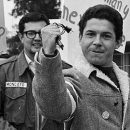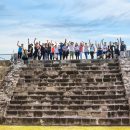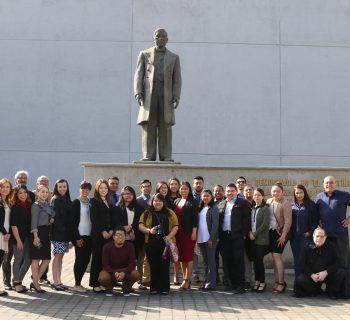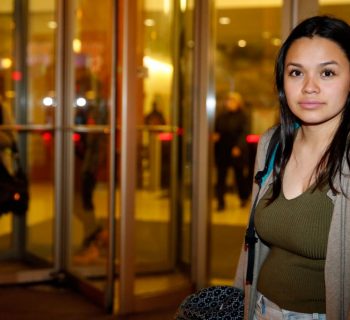A group of 34 young DACA immigrants will travel to Mexico as part of a program organized by the California-Mexico Studies Center…
BY: ARACELI MARTÍNEZ ORTEGA, La Opinión ~ May 17, 2017
The first time Lidieth Arévalo traveled outside the country at the end of 2015 under Advance Parole, she was terrified.
“I’ve gone six times with the California-Mexico Dreamers Study Abroad Program and little by little I’ve gained confidence. I’ve never had problems coming back,” confides Arévalo, a young Dreamer who in 2013 was a beneficiary of the Consideration of Deferred Action for Childhood Arrivals (DACA) immigration policy.
After graduating from university with a degree in documentary film production, she was hired as a program assistant for the California-Mexico Dreamers Study Abroad Program which takes a group of Dreamers to Mexico twice a year for purposes of academic study and family reunification.

Lidieth Arévalo, a DACA beneficiary, was able to travel to El Salvador and reunite with her father and brother thanks to the program. (Courtesy photo)
Although Arévalo is not Mexican, but Salvadoran, because of the program, she was able to travel to El Salvador twice, in 2015 and 2016. “It was so exciting to be able to see my brother, who was deported and who I hadn’t seen in eight years, and also my dad, who decided to return following his deportation,” she explains.
This young woman, who was brought to the United States when she was 13, feels that the trips to Mexico help Dreamers reconnect with their family and become empowered. “We feel more complete when we come back and very proud of our culture,” she comments.
The most diverse group
This summer, the California-Mexico Studies Center, under the direction of Professor Armando Vázquez Ramos and in collaboration with the Colegio de la Frontera Norte de México (COLEF), will take 34 student Dreamers to Mexico.
“This is the most diverse group we’ve had: 24 from California, three from New York, two from Wyoming, and one from Washington, Colorado, Wisconsin, Utah and Arizona, representing 23 universities throughout the United States,” says Vázquez Ramos. He notes that, of the 34 students, 29 are women.

The Dreamers who participated in the Winter 2016 study abroad. (Courtesy photo)
Professor Vázquez Ramos began taking Dreamers to Mexico in 2014, after DACA went into effect. Through the Dreamers Study Abroad program, more than 120 students have been able to travel to Mexico as part of an academic journey, but also one of family and cultural reunion.
“This will be the first time we’ll go without the support of a U.S. university and go with the backing of a Mexican university, the Colegio de la Frontera Norte in Tijuana,” he explains.
The reason for this, Professor Vázquez Ramos indicates, is that in the face of the current anti-immigrant climate and President Trump’s threats to eliminate DACA, universities fear something might go wrong.
But, the professor says, “We can’t let fear control us or stop doing things because of fear. Trump was expected to get rid of DACA his first day in office. And he didn’t do it then or during his second month as president. We have to keep going,” he emphasizes.

Jaime Jorge, DACA beneficiary, has returned to Mexico twice. (Courtesy photo)
The Dreamers’ journey to reunite with their roots will last 21 days, from August 1st to August 21st.
“The kids will spend most of their time with their family and are expected to complete a study on immigration that relates to their family,” he explains.
The journey will end with three days of conferences and workshops at the Colegio de la Frontera Norte in Tijuana.
“We’re all coming back on foot and we’ll cross the border at Tijuana on August 21st. But don’t take me for a fool--we’ll be accompanied by an immigration lawyer, American Civil Liberties Union (ACLU) leaders, and even priests. These will guarantee our reentry and, of course, we’ll have all our paperwork in order,” he explains.
He points out that one of the goals of this trip is to instill in the Dreamers that they are Mexican, but also American, that they can be players on both sides.
Emotional experiences
Jaime Jorge was one of the first Dreamers to travel to Mexico in 2014.
“In my case, my parents brought me to California 40 days after my birth in Acapulco, Mexico. I returned to Mexico when I was 26,” he remembers.
And he says that although he could not travel to Acapulco during that first twelve-day trip, his grandparents, aunts and uncles went to Mexico City to visit him. “It was an unforgettable reunion,” he notes.
On his second trip, he was able to visit Acapulco, Guerrero, and other Mexican states. “You learn about your country, connect with your roots, traditions and ways of life,” explains Jorge who grew up in Victorville and studied to be an interpreter. He admits that he enjoyed the experience so much that if he could, he would like to go back to live in Mexico for a year.
Her first trip
Ever since Karina Ruiz’s parents brought her from the State of Mexico to Arizona in search of the American Dream when she was 15 years old, she has not returned. But this summer, 18 years after coming to the United States, she’s making the effort to go back.
“What I’m most excited about is to see my brothers and sisters, my grandparents’ graves, going back to my house and my childhood, which was cut short when I came to this country,” she states.

Karina Ruiz, who holds a biochemistry degree and is currently an activist in Arizona will travel to Mexico for the first time this summer 18 years after her parents brought her to the U.S. (Courtesy photo)
But Ruiz, who is also a DACA beneficiary, sees this trip as an opportunity to learn more about the immigration process. “I’d like to talk to people who have been deported, find out why people immigrate, and get to the bottom of the problem,” she says.
At 32 years old, this Dreamer has become a pro-immigration activist. “This experience will help me become a better advocate,” she considers.
When asked if she’s afraid, she says fear is always there and she is aware of the possibility of being denied reentry. “I know I’m risking everything,” recognizes Ruiz, who is married with three children ages 15, 7, and 5.
Source: La Opinión
Translated by: Amber Workman







